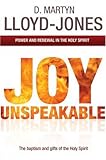 This book contains nine “reflections on the Psalms” from the famous preacher Dr Martyn Lloyd-Jones. What is curious about this book is that it contains no preface or introduction explaining why these particular sermons were chosen for this volume. Obviously nine sermons is no systematic coverage of the Psalms and, starting with sermons on atheism (Ps 14:1) and dead religion (Ps 50:21), it is not obvious that the original series (if indeed there was one) was necessarily on the topic of “seeking the face of God”. Whilst a couple of the sermons are clearly follow-ons from the previous one, there is no other indication that these form either part or the whole of a series. A footnote reveals that at least one of the sermons was preached in 1957.
This book contains nine “reflections on the Psalms” from the famous preacher Dr Martyn Lloyd-Jones. What is curious about this book is that it contains no preface or introduction explaining why these particular sermons were chosen for this volume. Obviously nine sermons is no systematic coverage of the Psalms and, starting with sermons on atheism (Ps 14:1) and dead religion (Ps 50:21), it is not obvious that the original series (if indeed there was one) was necessarily on the topic of “seeking the face of God”. Whilst a couple of the sermons are clearly follow-ons from the previous one, there is no other indication that these form either part or the whole of a series. A footnote reveals that at least one of the sermons was preached in 1957.
Following the evangelistic thrust of the first two sermons, the remainder of the sermons focus in on the importance of knowing God. Lloyd-Jones has a way of homing in on single phrases that other expositors might rush past to get to the more readily “preachable” verses. An example would be his two-part treatment of Ps 84, in which he devotes an entire sermon to Ps 84:3.
For me, the high points in this brief volume are the sermons in the second half, particularly the one on Ps 63:1-3. It is in these sermons that the book earns its title of “Seeking the Face of God”, as Lloyd-Jones presses home the importance of knowing God’s presence. The most important thing is to know that God is with us, that we have access to him, and that we can enjoy his presence, in the most humbling, the most difficult, the most truing of circumstances. He makes several of the same points that he does in the sermons contained in “Joy Unspeakable”, arguing that we need to become “God intoxicated”, and that we give him no rest until he has satisfied the longing of our hearts and granted us the Spirit in fullness.
Are you enjoying God? We are meant to. Shame on us if we are not.
Just because a man is an outstanding preacher, does not mean you can select a bunch of his sermons and automatically get a coherent book. However, despite its slightly disjointed start, I really enjoyed these reflections on the Psalms, and especially appreciated the fact that Lloyd-Jones is not content to simply be a master expositor, helping us understand the meaning of the text, but also preaches to the heart, urging us to desire to know God personally.
Make it the central thing of your life to gaze upon God, to arrive at a knowledge of Him that will be intimate and personal, a communion with Him that will ravish your heart and cause your soul to rise up to Him. Seek His face, and go on seeking it.

